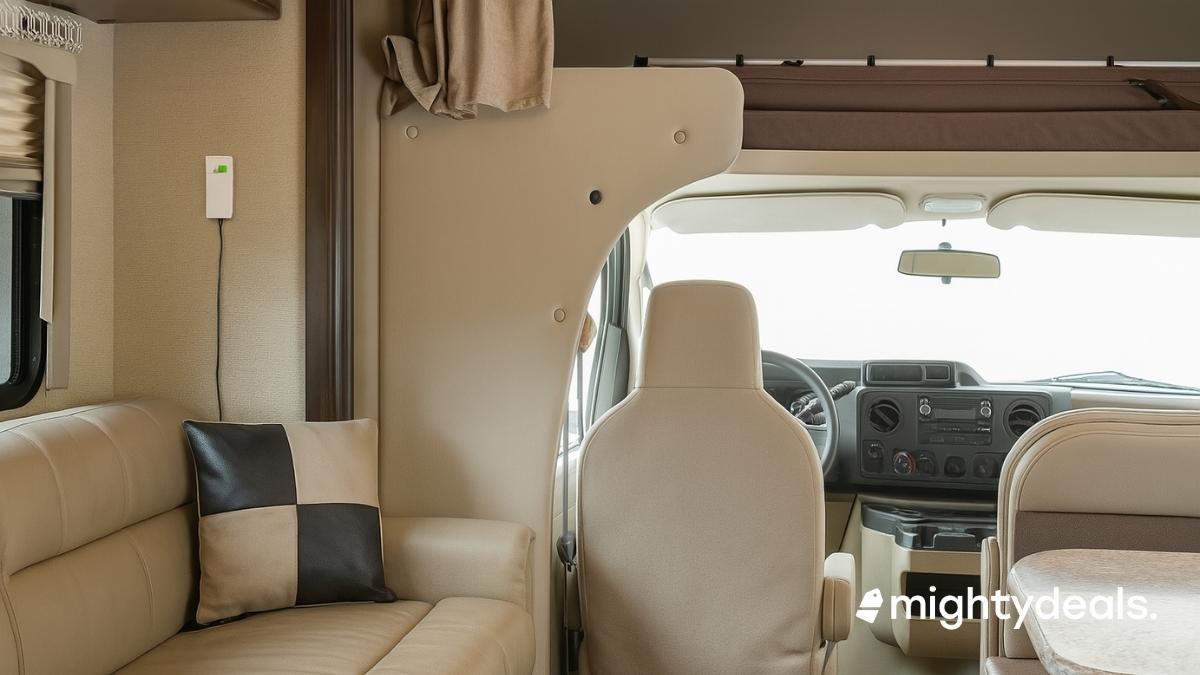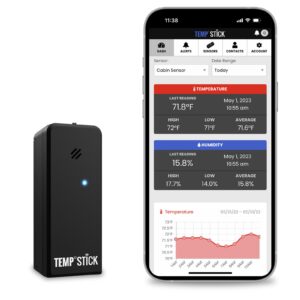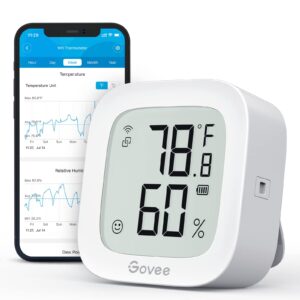We independently select all products and services. If you click through links we provide, Mighty Deals may earn a commission.
Keeping your RV comfortable and safe during your travels often means keeping a close eye on its internal temperature. RV temperature monitors are designed to track the climate inside your rig, ensuring that it remains within a healthy range for you, your pets, or sensitive equipment. These devices are especially helpful in extreme weather, providing peace of mind whether you’re on the road or parked for an extended stay.
When choosing the right RV temperature monitor, there are a few key factors to consider. Think about the accuracy of the readings, ease of installation, and whether the device offers remote monitoring. Features like Wi-Fi or cellular connectivity can allow you to check your RV’s temperature from your phone, which is invaluable if you’re away. Battery life and alert systems are also critical—reliable notifications can prevent small temperature fluctuations from becoming bigger problems.
We researched various models to find the best RV temperature monitors for different needs. Our goal is to help you identify the best options to keep your RV’s environment safe and comfortable.
Best RV Temperature Monitors
We’ve put together a list of the best RV temperature monitors to help you keep a close eye on the climate inside your RV with ease and reliability.
1. Necto Cellular RV Monitor
This is a solid choice for anyone needing reliable temperature and humidity tracking without monthly service fees.
Pros
- No Wi-Fi required, works with cellular service
- Two-year service included, saving on costs
- Immediate alerts for temperature, humidity, and power issues
Cons
- Limited to AT&T and T-Mobile networks
- Small size might be harder to locate visually
- Battery lasts 3 days, not ideal for long-term outages
Using this monitor felt effortless. We activated it in just a few minutes using the straightforward online portal. The dashboard was intuitive, letting us set custom alert thresholds and view past data effortlessly. It’s impressive how often readings refresh, giving us peace of mind in case of environmental changes.
The built-in battery was a lifesaver during a brief power outage. Even with no electricity, we still received updates so we knew everything was stable. If the battery runs low, it sends out a warning, which is convenient when planning ahead.
One of the standout features is the included cellular plan. We appreciated not needing Wi-Fi to stay connected while on the road. Those using RVs in remote areas will find this feature essential, making this an excellent choice for travelers.
2. Temp Stick WiFi Temperature & Humidity Sensor
This is a fantastic choice for anyone who needs reliable, subscription-free temperature monitoring for their RV.
Pros
- Easy to set up and use, even for beginners.
- Long-lasting battery life means less frequent maintenance.
- Free unlimited alerts via text ensure you never miss a critical update.
Cons
- Does not work with public or guest WiFi networks.
- Slightly higher price compared to other options.
- Only supports 2.4 GHz WiFi, not 5 GHz.
The Temp Stick is impressively user-friendly. Setting it up was simple, and the process only took a few minutes. The app is intuitive, and it’s a breeze to check the temperature and humidity in real time. This device is compact, fits neatly in any RV, and doesn’t clutter the space.
Its long battery life really stood out to us. With up to two years of operation on just two AA batteries, we could set it up and basically forget about it, knowing it would keep running. The unlimited text alerts give extra peace of mind, particularly when you’re traveling and relying on prompt updates for pet or equipment safety.
However, it’s worth noting some limitations. Since it can’t connect to public or guest WiFi, it’s not ideal for use at campgrounds or shared networks. Additionally, the premium price might be off-putting for those on a budget. Despite these minor drawbacks, the Temp Stick balances performance with convenience and keeps you in control from virtually anywhere.
3. Govee WiFi Thermometer Hygrometer
This is a reliable option for anyone looking to monitor temperature and humidity in their RV with ease and accuracy.
Pros
- Consistently delivers precise and quick readings
- Alerts us promptly when ranges go too high or low
- Easy-to-read display simplifies daily use
Cons
- Requires 2.4G Wi-Fi (no 5G support)
- Battery life could be better with heavy usage
- Setup felt slightly tricky for beginners
We’ve been using the Govee WiFi Thermometer Hygrometer to keep track of conditions inside our RV, and it’s been a dependable tool for the job. The Swiss-made sensor provides sharp accuracy, so we trust the readings it delivers. The app connectivity is a major perk, as it allows us to check the temperature and humidity no matter where we are.
The notifications are super helpful. If the settings go out of the ranges we’ve preset, the app sends us an alert, so there’s no need to constantly watch the monitor. However, setting up the device took a bit of patience, especially figuring out the Wi-Fi configuration since it doesn’t work with 5G.
One feature we particularly like is the electronic ink screen. It’s easy to read, even when lighting isn’t great, and adds to the user-friendliness. The device’s compact design means we can place it almost anywhere. Overall, this monitor feels like a great match for anyone traveling with temperature-sensitive equipment, pets, or even fragile supplies.
Buying Guide
When choosing the best RV temperature monitor, it’s essential to consider the most important features and how they fit our needs. Here are the key aspects we should focus on:
1. Temperature and Humidity Monitoring
We want a device that tracks both temperature and humidity levels accurately. Maintaining proper levels helps protect sensitive items and ensures comfort inside the RV.
2. Alerts and Notifications
Look for systems that send alerts through text, email, or mobile apps when temperature or humidity goes beyond preset ranges. This way, we can act quickly while we’re away.
3. Ease of Use
The monitor should be easy to set up and intuitive to use. Systems with clear instructions and simple controls save us time and effort.
4. Compatibility
We should ensure the monitor integrates seamlessly with our smartphones or other devices. Many models can be accessed through apps, which make real-time checking convenient.
5. Power Source
Consider whether the monitor is battery-operated, plug-in, or dual-powered. Battery life and backup options are crucial, especially if we’re on extended trips or boondocking.
6. Size and Portability
Compact and lightweight designs are ideal since space is limited in an RV. A sleek, portable design is easier to place and carry.
| Feature | Why It Matters |
|---|---|
| Temperature Accuracy | Protects RV contents |
| Alerts & Notifications | Immediate action when needed |
| Power Source | Ensures uninterrupted monitoring |
We should carefully compare options and focus on these features to find the right fit for our RV adventures.
Frequently Asked Questions
RV temperature monitors offer advanced features to ensure the safety and comfort of your RV environment. Whether you need Wi-Fi-free options, cellular connectivity, or pet-specific monitors, there are solutions for various needs.
How does an RV temperature monitor without Wi-Fi connectivity work?
These monitors rely on local sensors and often use Bluetooth to connect directly to your device. They store data internally or transmit it to your smartphone when nearby.
What are the advantages of using a cellular RV temperature monitor?
Cellular-enabled monitors offer real-time tracking from anywhere without needing a Wi-Fi connection. This is ideal for remote camping locations.
What options are available for RV temperature monitors with integrated cameras?
Some RV temperature monitors feature cameras for visual checks of the interior environment. These devices combine temperature monitoring with security features.
Can you recommend a pet-specific temperature monitor suitable for use in cars?
Pet-specific monitors are designed with alerts tailored to safe temperature ranges for animals. Models like Waggle provide mobile app notifications.
How do the features of Necto temperature monitors compare to those designed for RV use?
Necto designs temperature monitors with broader applications. RV-specific monitors often have durability and portability optimized for mobile use.
What are the key considerations when choosing an indoor/outdoor thermometer for an RV?
Accuracy, durability, and the ability to measure both inside and outside temperatures are essential. Additional features like weather tracking may also be useful.




